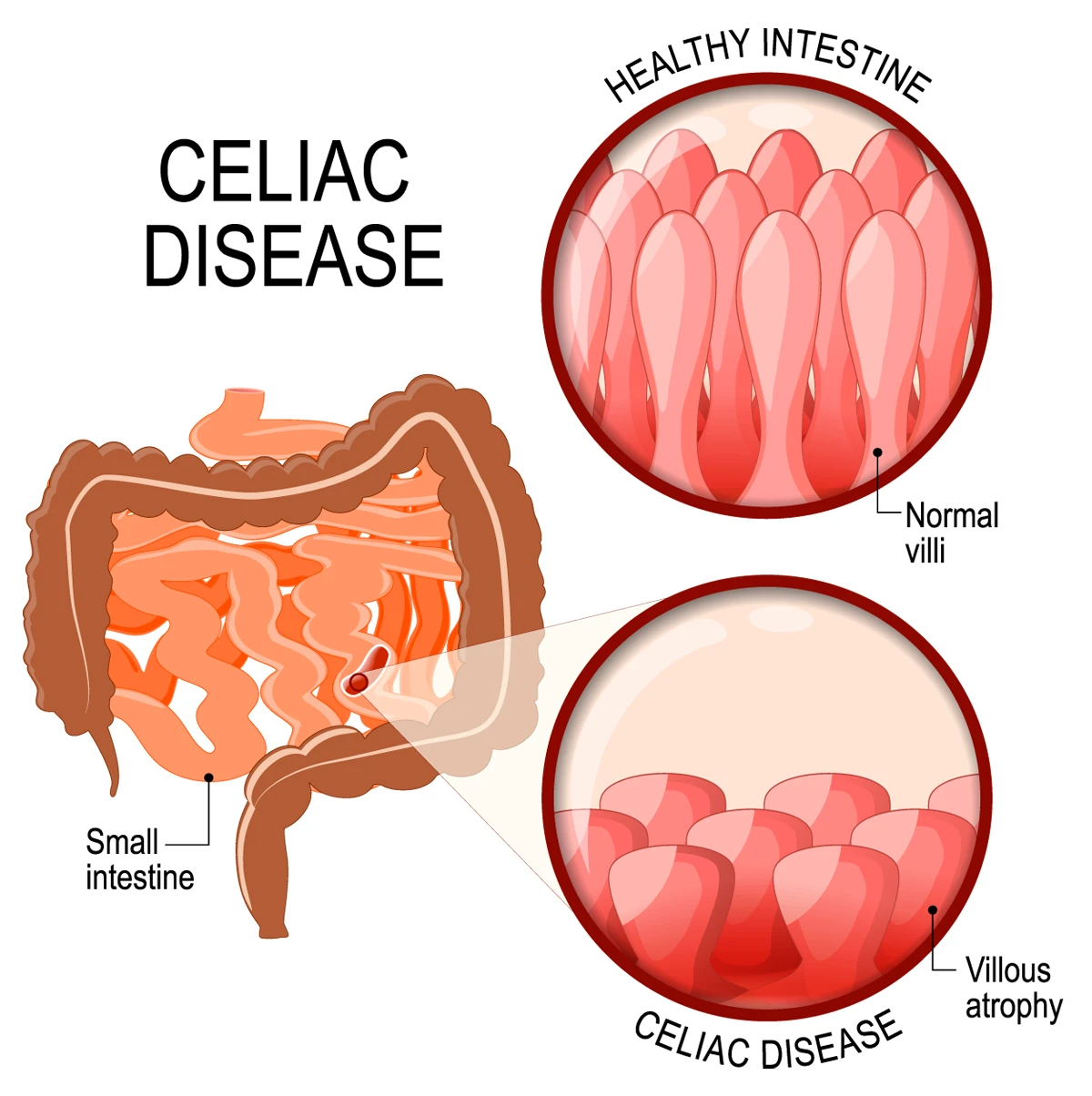Celiac disease
When you have chronic diarrhea or constipation, there are many conditions that may contribute to your symptoms. One of those conditions is celiac disease, which is triggered by exposure to foods or products that contain gluten.
What is celiac disease?

Celiac disease – also known as celiac sprue or gluten-sensitive enteropathy – is a chronic digestive and autoimmune disorder that causes damage to the lining of the small intestine.
Your small intestine is lined with slender stalks (villi). When a person with celiac disease ingests gluten products, an abnormal immune reaction damages the villi and makes them lose the ability to absorb nutrients properly. This damage (villous atrophy) can lead to serious health problems.
Celiac disease is diagnosed with blood tests and a biopsy.
What is gluten?
Gluten is a protein found in wheat, barley and rye grains. If you have celiac disease, you’ll need to avoid foods and products that contain gluten for the rest of your life. Common products that may contain gluten include some medicines, vitamins, supplements and cosmetics.
Conditions that mirror celiac disease
Non-celiac gluten sensitivity (NCGS) is a condition that shares many symptoms with celiac disease and has the same trigger for symptoms – gluten. Gluten sensitivity differs from celiac disease because it’s not hereditary or related to autoimmune reactions. There aren’t any tests to diagnose the condition and it doesn’t cause damage to the intestines.
Gluten sensitivity is sometimes referred to as gluten intolerance. Experts agree that the term gluten sensitivity is more medically accurate.
Being allergic to wheat also shares some digestive symptoms with celiac disease. But having a wheat allergy doesn’t cause damage to the intestines. Many of its symptoms are more like those of other allergies, such as:
- Swelling or itching in the mouth or throat
- Hives or rashes
- Congestion
- Headaches
An allergy to wheat is diagnosed using skin tests or blood testing for specific antibodies related to having a wheat allergy.
Celiac disease symptoms
Celiac disease symptoms look different for every person. The most common digestive symptoms for celiac disease include diarrhea or constipation. Other digestive symptoms of celiac disease include:
- Abdominal pain
- Bloating
- Gas
- Lactose intolerance due to damage to the small intestine
- Loose, greasy, bulky and bad-smelling stools
- Nausea or vomiting
Digestive celiac disease symptoms are more common in infants and children than in adults.
Celiac disease symptoms unrelated to digestion
Some people who have celiac disease have nondigestive symptoms such as:
- Bone or joint pain
- Depression or anxiety
- Dermatitis herpetiformis (an itchy, scaly rash)
- Fatigue
- Mouth symptoms such as dry mouth, canker sores, or a red, smooth, shiny tongue
- Nervous system symptoms such as balance problems, headaches or seizures
Children’s symptoms of celiac disease
Children who have celiac disease can’t absorb the nutrients needed for growth and development. If left untreated, they may have some of these symptoms:
- Damage to enamel of teeth
- Delayed puberty
- Failure to gain enough weight
- Slowed growth and short height
- Weight loss
Learn more about celiac disease in children and resources for people with celiac disease.
Complications of celiac disease
You may experience complications from celiac disease even if you do your best to avoid gluten and adopt a celiac disease diet. Some complications of celiac disease are:
- Anemia
- Increased risk of intestinal cancer
- Liver damage
- Malnutrition
- Nervous system problems
- Non-Hodgkin lymphoma
- Osteomalacia (softening of the bones)
- Problems related to the reproductive system
Celiac disease risk factors
Celiac disease affects about one in 100 people and can develop at any age. People with the following traits have a higher risk of celiac disease.
- Having DQ2 or DQ8 genes
- Having a family member who has celiac disease
- White people
- Females
- Having other diseases related to the immune system such as some thyroid diseases or Type 1 diabetes
- Having chromosomal disorders such as Down syndrome, Turner syndrome or Williams syndrome
Researchers are still looking for other risk factors for celiac disease including other genes that may be related.
Celiac disease diagnosis
When you see your doctor about your potential symptoms of celiac disease, they’ll start with a complete physical and ask about your personal and family health history. They’ll listen to sounds in your abdomen and check for any abdominal pain or swelling. They’ll also order blood tests to check for certain antibodies or signs of anemia, and genetic tests for genes related to celiac disease.
To test for signs and symptoms in your intestine, they’ll run tests of your digestive tract such as a capsule endoscopy to capture images and an upper GI endoscopy to remove a tissue sample (biopsy) from your small intestine.
Depending on which symptoms you have, your doctor may also test for a wheat allergy or for other digestive disorders such as irritable bowel syndrome (IBS) or inflammatory bowel disease (IBD).
Celiac disease treatment
If you’re diagnosed with celiac disease, your doctor will work with you to determine the best celiac disease treatments for you. They may prescribe medication for you if you have dermatitis herpetiformis.
You’ll be referred to a nutrition expert who specializes in gluten-free diets. They’ll help you with a celiac disease management plan that includes:
- A healthy celiac disease diet and meal plans to fit your preferences.
- Tips for avoiding medicines and other products that contain gluten.
- Finding vitamins and supplements to ease your celiac disease symptoms.
Damage to your intestines should heal once you’re following a gluten-free diet. You may notice your symptoms improving within days or weeks after changing your diet.
Get care
We help you live well. And we’re here for you in person and online.
